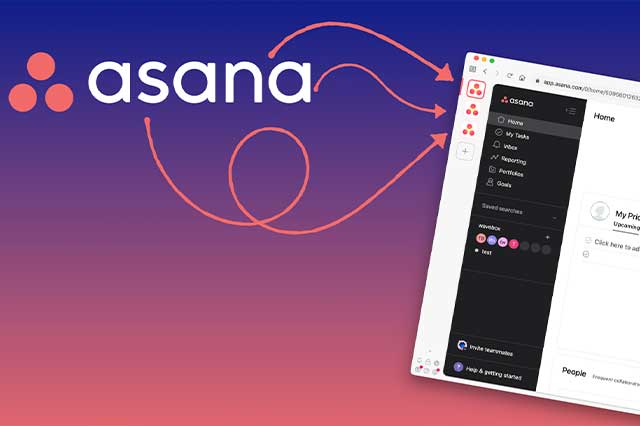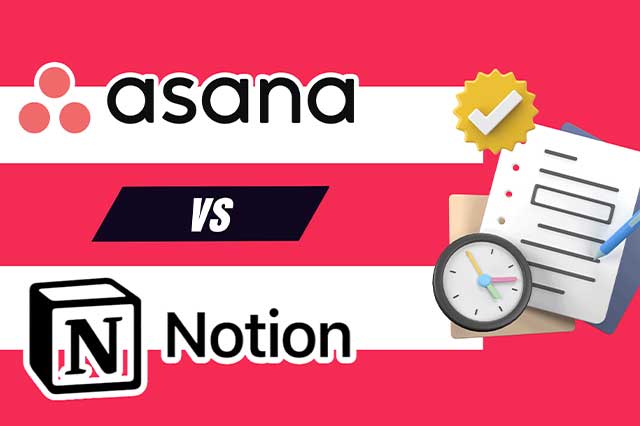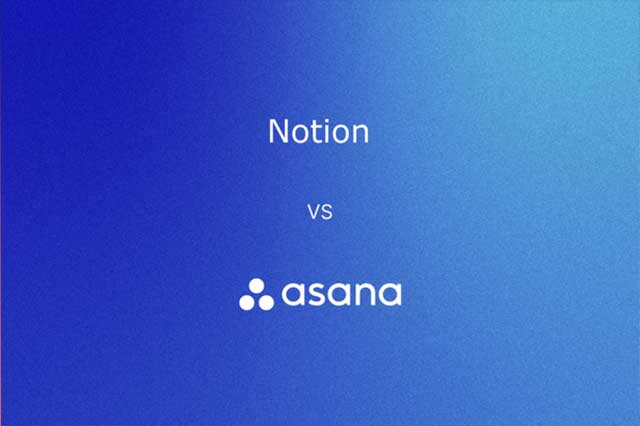There are several tools available in the market for streamlining productivity and project management. Asana and Notion are two of the most popular options. You can manage tasks, projects, and teams with the aid of these two productivity tools. Despite certain similarities, their functionality, pricing structures, and use cases differ.
Asana made a big splash in the project management industry in 2008. Notion arrived eight years later, and the market had to wait. Notion is a relatively new product, but it still offers a lot of powerful project management capabilities, and it’s among the top project management software programs, right up there with Asana, thanks to its all-in-one workspace design.
The more you examine each product in detail, the more Asana’s experience becomes apparent. In this case, the company’s better-developed software can be the deciding factor. Notion’s stylish and sophisticated software, however, might persuade customers to search for a more cutting-edge project management option.
Despite both tools supporting project planning, development, and execution, many prospective users find it difficult to decide which one is the best. Hence, we have come up with this guide to help you make the right decision.
Notion
Notion is a software for taking notes that may be utilized for project and task management through the usage of markdown pages and databases. It is a platform for collaboration that supports modified markdown and integrates wikis, databases, tasks, and Kanban boards for both group and individual work. It can also be viewed as a file management application that provides a single workspace, enabling users to join discussion groups, provide comments on ongoing projects, and get input on areas that need improvement.
Notion leverages blocks to accomplish much more than just taking notes, in contrast to straightforward note-taking programs. Notion pages are formed using blocks, which can be added to each row up to 50 times and add additional information to pages. You can organize your notes to match the needs of your team using the files, headings, text, calendars, tables, lists, checklists, etc. in these blocks. Along with cross-platform apps, a web browser can be used to access Notion.
Key Features of Notion

Here are some key features of Notion project management app.
- Text Editor: Notion’s text editor is one of its best features. It is easy to use and features pleasing aesthetics. You will find text elements such as links, headers, lists, callouts, quotes, and dividers. You can highlight content anywhere to change the color and use other basic formatting tools.
- Sub notes: You can organize complex notes with much ease which makes it easier for team members to grasp.
- Comments: This feature can be used to provide clarification to other teammates regarding the project.
- Task list: You can add tasks here to organize your process into different sections.
- Export Notes: This feature enables you to export notes in various file formats including PDF and HTML.
Asana
Asana helps teams plan their projects with much ease. You can easily track tasks and collaborate with other project members in real time thereby helping them improve communication with teams and with external parties. It is apt for businesses looking to improve their organizational structure while managing multiple projects. The tool is extremely customizable and helps foster better teamwork.
Asana assists the team members in numerous ways. This includes task assignment, defining deadlines, communicating task progress, solving complex situations and several others. This helps teams do away with distributing memos and emails. The tool is also packed with a ton of features which makes collaboration seamless. It is also possible to link the app with numerous applications such as Dropbox, Google Drive, Tableau, Salesforce, Zoon and many others.
Key Features of Asana
Asana offers interesting features to its users that makes project management a lot easier.
- Seamless communication: Asana allows the team members to communicate with much ease. Teams can keep a tab on the project progress by looking at the timeline. The members can comment directly on tasks to get specific details or resolve any queries. They can also leave feedback on PDFs and images shared by the members. This helps everybody stay connected real-time.
- Views: Asana helps you prioritize the tasks that you need to focus on. It allows you to receive notifications about the ongoing tasks, projects and conversations.
- Reporting: You can set, monitor and manage goals using the reporting function provided in the application.

What are the key differences between Asana and Notion?
The Asana project management platform prioritizes cooperation, procedures, and tasks. Its user-friendly interface allows you to assign tasks, create projects, set deadlines, and monitor progress. Additionally, Asana offers tools that might help you organize your workflow, such as calendar views, custom fields, and project Asana templates. Asana makes it easier to track time spent on project activities.
Notion on the other hand is a single workspace that integrates with databases, wikis, notes, and tasks. This adaptable tool helps you design databases and pages that are tailored, embedded, and linked to your requirements. It also contains features such as Notion templates. Notion interfaces with other applications thereby extending its capabilities.
Notion vs Asana: Layout and Appearance
Both Notion and Asana include screens with navigation bars on the left-hand side and areas where you can personalize your views on the main screen. You can use the templates provided by Notion to produce visually appealing designs and workflows.
The main screen of Asana displays readily customizable projects and tasks. You can customize an outlook using the workflow templates that are already available, and you can modify the workspace background by selecting a different theme.
Notion vs Asana: Ease of usage
Notion is a user-friendly platform for collecting notes where pages are made using blocks to cover all of your activities. You can organize the displays conveniently using templates. You can also organize them from scratch by using the drag-and-drop feature to create your dashboard, website, system, and more.
Asana is primarily designed for professionals who may use the program to manage projects. It may take more time to explore all of its deep functions, but the interface is very user-friendly. Since Asana is a cloud service, you must submit all the pertinent information for each project when logging in.
Notion vs Asana: Supported Platforms

Every significant operating system, including Windows, macOS, iOS, and Android, supports Notion. It can be viewed using browsers to access its web version. Notion has a consistent user interface (UI) across mobile, PC, and web. Asana is also available on all of the major operating systems, including Windows, macOS, Android, and iOS. Asana is also accessible through web browsers.
Notion vs Asana: Apps & Integrations
Notion allows integrations with over 200 apps including Microsoft Outlook, Google Calendar, Salesforce, Gmail, Mailchimp, etc. You can also code and connect with other apps using the API. Pages can also have blocks including cloud storage data, tweets, videos, prototypes, and videos. Asana users can integrate 100+ apps such as Dropbox, GitHub, Jira, Microsoft Office 365 and others.
Notion vs Asana Cost
Notion Pricing
Notion offers a variety of pricing options, from its Free plan for individual use to its Enterprise package for big businesses.
- Personal: It’s a no-cost model that may be shared with up to 5 guests and is designed for individual use.
- Personal Pro: It costs $4/month annually or $5/month and has all the features of Personal plus unlimited file uploads, visitors, and a thirty-day history.
- Team: This payment option is billed at either $10/month or $8/month annually. Additionally, to the limitless team members and collaborative workspace available in Pro, it has everything else.
- Enterprise: This is the last pricing tier that Notion offers, and it comes with all the functionality of the other tiers plus extras like SAML SSO, sophisticated security, and controls. Enterprise requires a
Asana Pricing
Asana offers a range of pricing plans, starting with Basic and ending with Enterprise.
- Basic: Its freemium package, which provides limitless tasks and projects, unlimited file storage (100MB per file), the ability to collaborate with up to 15 peers, etc., can be used by individuals or teams just getting started with project management.
- Premium: This pricing option is best for businesses who need to manage projects with timelines, countless dashboards, advanced search, an infinite number of free visitors, etc. The cost is $13.49 monthly and $10.99 annually.
- Business: This plan, which is invoiced at $30.49/month and $24.99/month yearly and includes all the capabilities of Premium, is perfect for teams and businesses who need to manage projects across numerous initiatives.

Notion vs Asana vs Monday
All these tools are aimed at professionals serving different purposes. Notion is an all-in-one workspace that combines task management, note-taking, and knowledge-sharing capabilities. The tool is flexible and ideal for teams looking for a versatile platform to create custom databases.
On the other hand, Asana focuses on project and task management. Its user-friendly interface and rich features like calendars and timeless help in tracking the project effectively. It is ideal for professionals looking for a simple interface and clear project organization.
Monday.com is another visual project management tool that features Kanban-style boards. It provides a better overview of the tasks which makes it a great choice for teams that prefer a highly customizable and visual approach.
The choice of your tool is entirely dependent on your needs. Notion is ideal for teams looking for consolidation of information and flexibility. Asana assists with straightforward task management. Monday.com is ideal for visual project tracking. While choosing the app study the requirements of your team and the nature of the project to make the right choice.
Notion vs Asana Project Management
When it comes to viewing and interacting with your tasks, the finest project management tools typically give you a variety of alternatives. With their Kanban boards, calendars, lists, and timeline views of your tasks, Asana and Notion appear to have a project management solution for every user. Both simple project management and handling complicated projects can benefit from these features.
You may establish due dates, add subtasks, assign tasks to other users, and prioritize your tasks in order to manage your workload. To provide your team the greatest possible starting point for finishing the work, you can also integrate links and other information into task cards. You can simultaneously work on many projects and set task dependencies.
Artificial Intelligence
We’re all more aware of the ways we can apply AI in our processes now that ChatGPT has become so popular. Asana and Notion are working to integrate AI into their systems to significantly simplify your workday.

Since we are still expecting the debut of Asana, we are unable to comment. You can read our comprehensive guide on using Notion AI to learn more about the AI capabilities that are already at your disposal. You may use Notion to instruct its AI to produce articles and news updates for your team. You can provide the AI consumer data and ask it to produce a summary and table of all the important details. We anticipate that it will continue to grow over time, which could get done with much more accurate efficiency.
Integrations
Notion and Asana allow you to integrate third-party apps within the platform. This assists you in making project management a lot easier. You can integrate Google Drive with these apps to share files, IFTTT to create automatic project flows and Slack to communicate with much ease. Both Asana and Notion have a wide range of connectors ranging from customer relationship management to collaborative tools. With over 100 integrations, Asana offers better choices to the teams. However, Notion is not far behind. It offers around 60 app integrations.
Customer Support
The users of Asana and Notion have access to a ton of resources about how to use the platform seamlessly. Asana features a knowledge database as well as a course library that can be accessed from the academy. There is a live chat feature that you can use to receive immediate technical assistance from the staff.
Notion lets you interact with other users about using the platform on its Discord channel. You can also access the knowledge base to learn about the features. Though the app doesn’t offer any real-time assistance, you can email your concerns to the team if you are on a subscription plan.
User Interface
No real comparison can be made between the user interfaces of the two tools. Which one would you prefer is dependent on your personality. Notion is a black and white interface while Asana is a colorful platform brimming with warmth. Notion would appeal to people who prefer a clear and clean interface. Asana however is simpler to use despite the rich features and integrations.

Notion is also easy to navigate but you need some practice to become familiar with the operation. Once you create your account, Asana is ready to use. Which interface you prefer depends on your preferences. However, experts prefer Asana’s layout and features.
Other project management tools
If you haven’t found a clear winner, you can look for an alternative. There are more choices available when it comes to project management. For instance, you can try out Monday.com which is a great alternative for Asana. It has a smoother interface, functionality, and a better pricing structure. ClickUp would make a better substitute for Notion. It features a native document and is ideal for users who are on a tight budget.
Notion vs Asana vs ClickUp
Notion, Asana, and ClickUp are notable project management and productivity tools. While Notion excels as a flexible all-in-one workplace, it also provides a solid platform for team collaboration, knowledge management, and task tracking. Teams that are looking for an all-in-one solution would prefer Notion because of its customizability and versatility.
Asana on the other hand is popular for its ability to manage projects and tasks. It offers a simple and methodical way of overseeing tasks, teams, and projects. Teams looking for a streamlined project management system will prefer Asana owing to its easy user interface and integration possibilities.
ClickUp offers a fully customizable workspace along with sophisticated task and project management tools. ClickUp is ideal for individuals who are looking for an organized tool for project management and a dynamic data organizing tool.
The choice of which project management tool you prefer depends on your professional needs and preferences. Notion is a comprehensive all-in-one tool. While ClickUp is flexible and an organized platform for project management, Asana is best for individuals looking for a task-focuses management tool.
Notion vs Asana for personal use
Both Asana and Notion have advantages over the other when you use them for personal use. As already discussed, Notion is a flexible all-in-one tool that is better at note-taking, task organization, and personal knowledge management. It is ideal for people looking for a feature-rich personal productivity tool. This is because it gives you the freedom to customize your workspace as per your requirements.

Asana has a more structured layout even if you want to utilize it for personal use. It is primarily preferred for project and task management. It has a simple procedure for task allocation, setting deadlines, and coordinating with others. Asana is a great tool when it comes to keeping track of personal tasks and projects owing to its straightforward layout.
It all depends on your choices as to which platform you will prefer for personal use. Notion is more versatile which can be alluring to some. Asana on the other hand has a user-friendly layout. It can be more suitable for you if you are looking for a solution that can be used primarily for task management and for monitoring project progress. You can decide on the platform depending on your productivity and personal needs.
Notion vs Asana Pros and Cons
Notion Pros
- A single platform that unifies wikis, databases, notes and tasks
- Can be customized to suit the needs of teams
- Powerful real-time communication capabilities
Notion Cons
- The free version is restricted
- It is not as comprehensive as Asana as a project management tool
- Limited offline mode availability
Asana Pros
- Is a comprehensive task management tool
- Features automated workflows to speed up user operations
- Effective team collaboration skills
Asana Cons
- Limited free version
- New users may find the ton of features overwhelming
- Expensive when compared to other project management software
Which one, Notion or Asana, is superior?
There is no clear winner between Asana and Notion because they are both made for different kinds of teams and procedures. Notion will probably be a fantastic fit for your needs if you’re seeking a highly adaptable productivity tool for a personal project. Asana might be the best option if your team is seeking a platform to manage large-scale projects in a collaborative manner.
FAQs
1. Why is Asana so popular?
Asana has a distinct identity as a top project management software alternative. This cloud-based tool is a practical option for remote teams. It allows you to access the projects from anywhere. The range of project views offered by the tool is one of its main advantages. You can tailor the view depending on the requirements of your team. You can choose from a variety of options such as calendar views, Kanban style, workload overviews, and more. You can incorporate more stakeholders and encourage teamwork owing to the flexibility.
2. Is Notion or Asana better?
Asana has a simple interface and sophisticated functions. Notion on the other hand is a basic productivity tool that helps teams manage their tasks effortlessly. If you prefer a ton of integrations and complex features, then you will love using Asana. Notion is a simple interface and does provide integrations. However, Asana has more options for teams.
3. How is Asana different from Notion?
Asana’s project management tool features tasks, and team collaborations and features a simple and user-friendly interface. You can assign tasks, create projects, set deadlines, and monitor the progress with ease using Asana. Project templates, calendar views, and custom fields are additional capabilities in Asana. The integrations and rich features make Asana stand out.
Notion is an all-in-one workspace that integrates notes, tasks, databases, wikis, and more. This versatile tool allows you to create databases effortlessly. It contains Notion interfaces and templates which makes organization a lot easier.
4. Can you use Notion with Asana?
It is possible to transfer projects, tasks, and teams from your organization’s Asana account to Notion by using the import feature offered by Asana. The Asana importer can be accessed by all members regardless of their plan tier. You can select Asana by clicking on the Import feature that you can find at the bottom of the Notion sidebar. Choose the Asana workspace after logging in. Then select the files you want to import.
5. What are the disadvantages of the Notion app?
One of the biggest disadvantages of using Notion is that some users may find it difficult to use. You may find it difficult to learn when to begin as there are different kinds of templates and blocks accessible. New users may find it challenging to use Notion. Moreover, Notion does not let you track goals. Although you can set goals and track the progress, the platform does not come with any tools that help you with tracking.
Another drawback of Notion is that it comes with a built-in reporting tool. This makes it challenging to create reports and evaluate data on the platform. Although workarounds are available, they may not be as efficient as the dedicated reporting tool offered by Asana. The lack of communication tools also makes Notion less desirable for teams.

![Notion vs Asana [Comparison to Help You Choose]](https://martin.360elevate.co/wp-content/uploads/2023/10/Notion-vs-Asana.jpg)